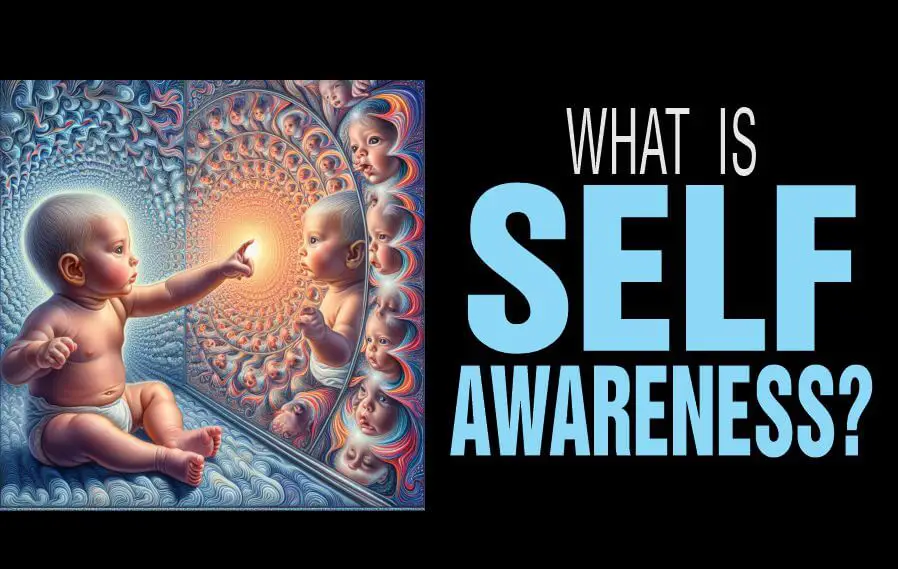Last updated on June 10th, 2025 at 01:53 pm
You think you know yourself, but do you? Self-awareness shapes how you think, act, and connect with others. It influences your decisions, emotions, and personal growth. Understand being self-aware, types, examples, and importance in relationships for a more fulfilling life.
Understanding yourself is a fundamental aspect of personal development and emotional intelligence.
It is the foundation for self-mastery and involves recognizing your thoughts, emotions, and behaviors, and how they influence your interactions with others.
Without it, you might repeat mistakes, struggle with relationships, or feel stuck in life.
This guide will show you how to be self-aware, the different types, and real-life examples that reveal its impact.
You’ll discover practical ways to sharpen your self-perception, emotional mastery and recognize blind spots.
Whether you’re improving your mindset, career, or relationships, mastering self-awareness gives you the clarity to move forward with purpose.
Ready to see yourself more clearly? Let’s begin.

Table of Contents
- What Is Self-Awareness?
- Importance of Being Self-Aware
- Watch this Video on the Power of Being Aware of the Self (18mins 10 sec)
- Types and Examples of Self-Awareness
- The Difference Between Awareness of Self, Self-Consciousness, and Self-Reflection
- Psychological and Philosophical Perspectives
- Signs of High and Low Self-Awareness
- How to Develop Self-Awareness
- Development of Self-Awareness from Childhood
- Common Challenges in Becoming Self-aware
- How to Overcome These Challenges
- The Connection Between Self-Awareness and Other Aspects of Life
- Awareness of Self Skills
- Self-awareness Activities
- Watch this Video on Increasing Awareness of Self (2mins 38 sec)
- Frequently Asked Questions
- A Word from The Conducts of Life
What Is Self-Awareness?
Self-awareness is knowing how your thoughts, emotions, and actions shape your life. It helps you understand your strengths, weaknesses, and values while also recognizing how others see you. When you pay attention to your reactions, habits, and choices, you gain better control over your decisions and relationships. Without it, you might repeat mistakes, misread situations, or struggle to communicate.
As reiterated by GetMarlee, self-awareness, also known as self-consciousness or self-knowledge is a skill of many components.
In 2020, researchers Julia Carden, Rebecca Jones, and Jonathan Passmore at the University of Reading worked to clarify what self-awareness really means. After reviewing 31 research articles, they came up with this definition:
“Being self-aware includes different parts that can be developed through focus, evaluation, and feedback. It helps a person understand their internal state (like emotions, thoughts, and physical responses), which drives their behavior (such as beliefs, values, and motivations). It also involves understanding how this affects and influences others.”
Related: What is Cultural Self-awareness?
Importance of Being Self-Aware
According to the author of Emotional Intelligence, Danielle Golemena, self-awareness shapes how you think, act, and connect with others. It helps you understand your emotions, recognize your strengths and weaknesses, and make choices that align with your values.
Here’s why it’s important:
1. Smarter Decisions
When you know how your thoughts and emotions influence your actions, you make clearer choices. Being knowledgeable about yourself helps you spot biases, weigh different perspectives, and act with purpose instead of impulse.
2. Emotional Control
Recognizing your emotions lets you manage them before they take over. Instead of reacting out of frustration or stress, you can step back, process the situation, and respond in a way that benefits you and those around you.
3. Stronger Relationships
Your words and actions affect the people in your life. Knowing yourself inside-out helps you notice when you’re being defensive, dismissive, or too critical. With this awareness, you can adjust how you communicate and build healthier connections.
4. More Self-Discipline
Knowing your triggers gives you an edge in controlling your reactions. When emotions try to take the lead, you can pause, reflect, and choose a response that serves you better. This skill is key in handling stress and challenges.
5. Confidence Without Arrogance
Understanding your strengths helps you use them wisely while acknowledging your weaknesses allows you to improve. This honest view of yourself builds confidence and self-esteem without tipping into overconfidence or self-doubt.
6. Better Mental Well-Being
Recognizing negative thought patterns before they spiral can help you avoid unnecessary stress. Self-awareness lets you spot unhealthy habits, shift your mindset, and develop better coping strategies.
7. Growth in Work and Life
Self-knowledge pushes you to learn from mistakes, adapt to challenges, and keep improving.
Emerson’s The Conduct of Life emphasized so much on self-awareness buttressing its importance in the journey of life.
Whether in personal relationships or leadership roles, it helps you build trust, communicate clearly, and create a positive environment.
Watch this Video on the Power of Being Aware of the Self (18mins 10 sec)
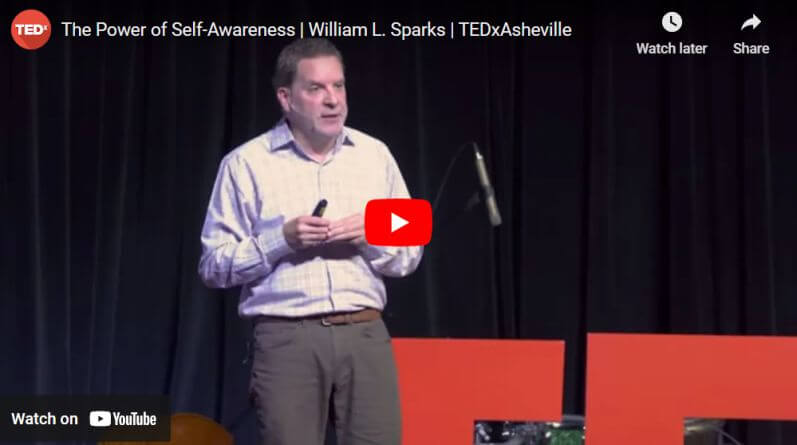
The Power of Self-knowledge | William L. Sparks | TEDxAsheville
Types and Examples of Self-Awareness
According to TrackingHappiness, three examples of self-awareness can be broadened into more.
But we will break it down here into five types and examples according to how you understand yourself and interact with the world:
- Private or internal self-awareness
- Public or external self-awareness
Private or Internal Self-Awareness
This is about understanding yourself on a deeper level. It involves knowing your values, recognizing your emotions, and identifying your strengths and weaknesses.
With internal knowledge of yourself, you can better understand why you feel a certain way or why you react the way you do in different situations.
This insight allows you to make more informed decisions and live in a way that aligns with your true self.
Examples
| Private self-awareness is seen when someone introspectively reflects on their emotions, like anxiety, to understand their causes and influence on behaviour. |
Public or External Self-Awareness
Public self-awareness focuses on how others perceive you. It’s about being mindful of the way your actions, words, and behavior are seen by the people around you.
It involves sensitivity to social cues, norms, and the ability to adjust your behavior in different social contexts.
This type of self-knowledge helps you build stronger relationships because you can adjust your behavior to communicate more effectively and be more empathetic.
It helps you gauge how your actions affect others and encourage better understanding in both personal and professional settings.
Example
| At a social gathering, a person is attentive to the cultural norms and social cues of the environment. They adapt their behavior and conversation topics to align with the social context, showing sensitivity to how they are perceived by others and their impact on the social dynamics, thus exhibiting public self-consciousness in a social setting. |
Emotional Self-awareness
Being emotionally self-aware is the ability to recognize, understand, and manage your emotions effectively.
People with a high degree of emotional self-knowledge can identify specific emotions they are experiencing, understand the triggers behind those emotions, and regulate their emotional responses appropriately.
Cognitive Self-awareness
Cognitive awareness of self involves understanding and recognizing your thought processes, cognitive biases, and patterns of thinking.
It enables you to critically evaluate your beliefs and assumptions, enhancing your decision-making abilities and intellectual growth.
Social Self-awareness
This type of awareness revolves around understanding and perceiving yourself within societal contexts and social interactions.
It allows you to comprehend your impact on others and adapt your behavior accordingly, leading to improved interpersonal relationships.
The Difference Between Awareness of Self, Self-Consciousness, and Self-Reflection
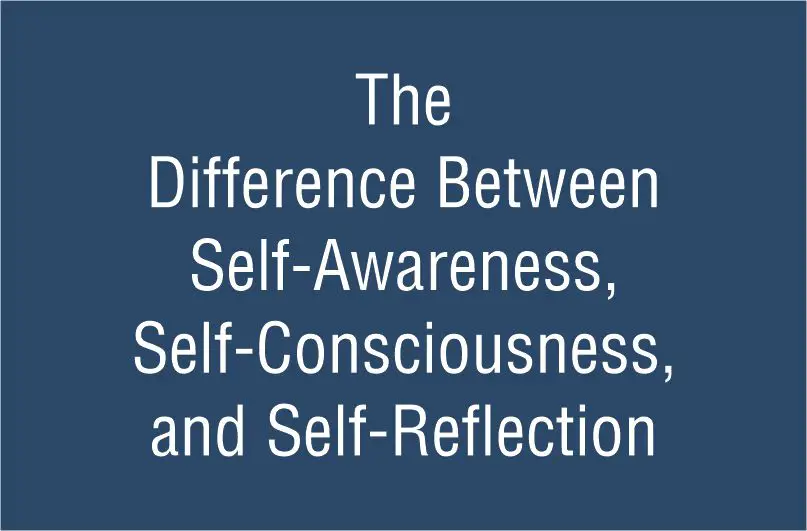
While self-awareness, self-consciousness, and self-reflection all involve being mindful of yourself, they differ in important ways:
- Self-Awareness: This is about having a clear understanding of your emotions, thoughts, and behaviors, both privately and publicly. It’s about knowing your strengths, weaknesses, values, and how you interact with others.
- Self-Consciousness: This involves being overly aware of yourself, often in a way that leads to anxiety or self-doubt. It can cause you to focus too much on how others see you, which may affect your behavior negatively.
- Self-Reflection: This is the process of thinking deeply about your experiences, thoughts, and actions. Self-reflection helps you learn from past experiences and better understand your choices, which can increase your self-awareness.
Psychological and Philosophical Perspectives
From a psychological standpoint, being self-aware is seen as a key part of emotional intelligence and personal growth.
Psychologists suggest that people are highly self-aware are more in touch with their emotions and reactions, which can lead to better decision-making and healthier relationships.
From a philosophical perspective, knowing yourself has been explored as part of what it means to be human.
Philosophers like Socrates emphasized the importance of “knowing thyself” as a way to live a more authentic life.
This deeper level of self-knowledge connects you to your purpose and the choices you make in the world.
Signs of High and Low Self-Awareness
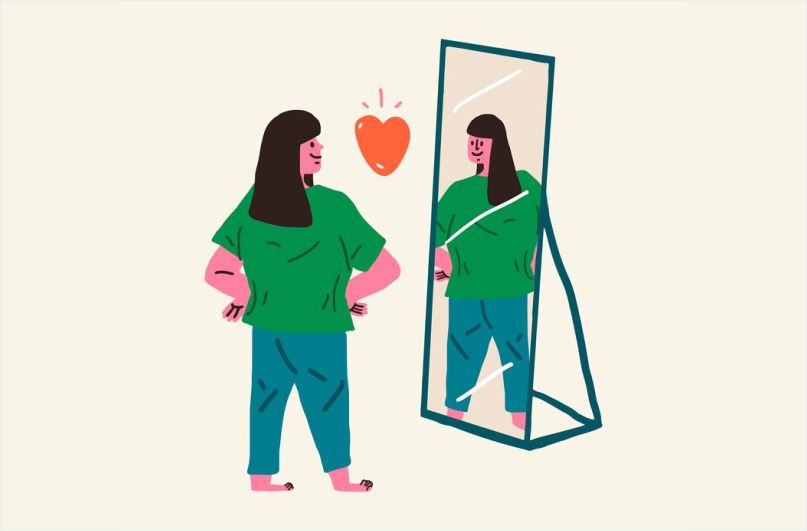
Self-awareness shapes how you handle emotions, relationships, and challenges. Let’s look at what high and low self-awareness look like and how they impact your life.
Signs of High Self-Awareness
According to Idea Pod, if you are tightly self-aware, you tend to manage your emotions well. You don’t let frustration or stress lead your reactions. Instead, you pause and reflect, choosing your response with care.
This makes your interactions smoother and your relationships stronger because you can empathize with others and understand their viewpoints.
Another sign is openness to feedback. You’re not afraid to hear what others think.
Constructive criticism is something you see as a chance to grow, not as a personal attack.
You reflect on your actions, learn from them, and use that knowledge to improve both personally and professionally.
With strong self-awareness, you actively seek ways to improve. Whether it’s through feedback or self-reflection, you create a cycle of growth that sharpens your skills and enhances your emotional intelligence.
Signs of Low Self-Awareness
According to Well and Good, low self-awareness shows up differently. You may struggle to control your emotions, reacting impulsively instead of thoughtfully.
This can lead to misunderstandings and conflicts, affecting both personal and work relationships.
People with low self-awareness often avoid feedback. They may take criticism personally, seeing it as an attack rather than a chance to improve.
This defensiveness can prevent growth and make it harder to learn from mistakes.
If you notice these traits in yourself, it’s a signal that you might benefit from improving your self-knowledge.
Self-awareness tests can help you spot these tendencies and take steps to change them.
By recognizing whether you lean toward high or low awareness of self, you can start taking action to improve your emotional regulation, communication, and overall relationships.
This self-understanding can help you move toward growth and better decision-making.
Related: Powerful Leadership with Self-awareness
How to Develop Self-Awareness

As reiterated by VeryWellMind, developing self-awareness takes time, but it’s a powerful tool that can shape your personal and professional life.
By getting to know your thoughts, feelings, and actions, you can gain better control over your choices and relationships. Here’s how you can build self-awareness in practical ways.
1. Practice Mindfulness
Mindfulness is about being fully present in the moment without judgment. By paying attention to your thoughts and feelings as they come and go, you can start recognizing emotional triggers and patterns in your reactions. This awareness allows you to respond thoughtfully instead of acting impulsively.
2. Try Journaling
Journaling is a great way to reflect on your experiences and emotions. By writing regularly, you can analyze your thoughts, discover recurring themes, and understand what motivates your behavior. It helps you track how you’re feeling and why you react in certain ways.
3. Ask Deep Questions
To get to the core of who you are, ask yourself thought-provoking questions like “What do I value most?” or “How do my emotions influence my decisions?” Reflecting on these questions can help you identify what truly matters to you and how it shapes your choices.
4. Seek Feedback from Others
Becoming self-conscious isn’t just about looking inward, it’s also about understanding how others see you.
Ask friends, colleagues, or mentors for feedback on your behavior and communication style.
It can provide valuable insight into areas you might overlook and help you adjust your actions for better connections.
5. Practice Active Listening
Active listening means fully engaging with the speaker, focusing on their words, and responding thoughtfully.
By improving your listening skills, you can better understand others’ perspectives and improve your relationships, which also contributes to your self-awareness.
6. Use Personality Assessments
Assessments like the Myers-Briggs Type Indicator can provide insight into your personality, behavior, and tendencies.
These tools can help you understand yourself better and recognize patterns in your thinking and actions, offering a clearer picture of how you show up in the world.
Development of Self-Awareness from Childhood
Being aware of yourself doesn’t develop overnight. It’s a gradual process that starts early in life and continues to grow as you age. Here’s how it unfolds at different stages.
Early Infancy (2 to 3 months)
In the first few months of life, babies begin recognizing their own bodies. Around 2 to 3 months, you may notice them bringing their hands to their mouths or watching their limbs move.
This marks the beginning of self-awareness—when babies start to realize they exist as separate beings.
Self-Recognition (6 to 12 months)
As babies grow, they begin to engage with their reflections. By 6 to 12 months, many babies show interest in mirrors.
They might smile at their reflection or reach out to touch themselves, which signals they’re starting to recognize themselves. This is known as mirror self-recognition, a key milestone in developing self-consciousness.
Toddler Years (18 to 24 months)
From 18 to 24 months, toddlers start to understand themselves on a deeper level. They begin using words like “me” and “mine,” showing they have a sense of autonomy.
They also start realizing their thoughts and emotions are separate from those around them. This stage marks a shift toward a more advanced understanding of self-awareness.
Related: Signs You Lack Self-awareness
Common Challenges in Becoming Self-aware

Building self-awareness is key to both personal and professional growth, but it can be tough.
Many people face obstacles that make it harder to truly understand themselves. Here are some common challenges you might encounter along the way:
1. Fear of Confronting Your True Self
One of the biggest barriers is the fear of facing your true self. You might worry about confronting aspects of your character that feel uncomfortable, like insecurity or arrogance.
These traits can stir up feelings of shame, making it tempting to avoid self-reflection altogether.
However, avoiding this confrontation can stop you from growing and improving, both in relationships and professionally.
2. Dismissing Feedback
Another common challenge is ignoring or misinterpreting feedback. When someone offers constructive criticism, it can feel like a personal attack, even if it’s meant to help you grow.
This often leads to defensiveness and makes it harder to take a step back and reflect.
Over time, this can create a cycle where you avoid self-assessment, preventing you from making progress.
3. Overcoming Emotional Barriers
Emotions like shame and guilt can hold you back from fully engaging with your own self-awareness.
The fear of vulnerability and the discomfort of facing your shortcomings can keep you from reflecting on your actions or understanding why you act the way you do.
These emotional responses often cause people to resist looking deeper into themselves.
How to Overcome These Challenges
To overcome these barriers, it’s important to shift your mindset. Instead of seeing feedback as a negative experience, try to view it as a valuable tool for growth.
Embrace regular self-reflection to help you process emotions like shame or guilt, and find ways to address them.
Practices such as journaling, mindfulness, or self-awareness tests can prompt introspection and help you move past emotional barriers.
Seeking support from a mentor, coach, or counselor can also provide an objective perspective. They can guide you through the uncomfortable process of self-discovery, helping you grow in a healthier, more balanced way.
Related: The Five Obstacles to Mastering the Self
The Connection Between Self-Awareness and Other Aspects of Life
Self-knowledge influences almost every aspect of your life, how you interact with others, your work, and your overall sense of fulfillment.
The more you understand yourself, the better you can communicate, handle conflicts, and stay aligned with your values.
Here’s how it shapes key areas of your life:
1. Being Self-aware in Relationships
When you’re in tune with your emotions and reactions, it becomes easier to manage them, especially in tense moments.
Take a disagreement, for example. If you recognize that you’re getting upset, you can pause and choose a more thoughtful response, rather than reacting impulsively.
This practice of being aware of yourself strengthens your relationships because you gain a deeper understanding of your own needs, which helps you connect with others more effectively.
2. Awareness of Self at Work
Self-knowledge isn’t just useful in personal situations—it’s just as valuable in the workplace.
Whether you’re working on your own or leading a team, being mindful of your emotions and behaviors can improve your work performance.
Self-aware leaders are better at understanding their team’s needs and building trust, which leads to a more productive environment.
For anyone in a team, understanding your interactions with others helps you collaborate and adapt to different work dynamics more smoothly.
3. Awareness of Self and Personal Fulfillment
Self-knowledge goes beyond knowing your thoughts and feelings; it’s about connecting your actions with your core values.
When you’re clear on what matters most to you, it’s easier to make choices that align with your beliefs and goals.
People who practice self-knowledge often report feeling more in control of their lives and more fulfilled.
This clarity also helps you resolve conflicts because you can express your values and needs clearly, making sure your voice is heard.
4. Using Self-Awareness Tools for Growth
Tools like personality tests and self-reflection exercises offer a deeper look into your behaviors and emotions.
These resources can help you identify areas where you can grow, improve decision-making, and strengthen relationships.
Regularly checking in with yourself through these tools provides clarity and helps you track your personal growth over time.
Related: Understanding Emotional Awareness
Awareness of Self Skills
Some skills are essential for self-knowledge towards personal growth, effective communication, building strong relationships, and making informed decisions.
Let’s take a closer look:
Some important components of self-consciousness skills include:
1. Emotional Awareness: Being able to identify and understand your emotions and how they affect thoughts and behavior.
2. Self-reflection: Taking the time to objectively analyze and evaluate your thoughts, actions, and experiences to gain insight and grow.
3. Self-acceptance: Acknowledging and accepting your strengths and weaknesses without judgment, and embracing your true self.
4. Mindfulness: Being fully present in the moment and aware of your thoughts, feelings, and sensations without judgment or attachment.
5. Self-regulation: The ability to manage and control your thoughts, emotions, and behaviors to respond appropriately to different situations.
6. Values Awareness: Understanding your core values and beliefs, and aligning actions and decisions with these values.
7. Empathy: The capacity to understand and share the feelings of others, which enhances self-consciousness by providing a different perspective.
8. Feedback Seeking: Actively seeking feedback from others to gain insights and improve self-knowledge.
9. Authenticity: Being true to yourself and expressing yourself genuinely, without pretending or conforming to the expectations of others.
Self-awareness Activities
These activities are exercises or practices that help you learn more about yourself, thoughts, emotions, and actions.
They are designed to promote self-reflection, self-discovery, and self-improvement.
Here are a few examples of activities that will do just those for you:
1. Mindfulness Meditation
This activity involves focusing your attention on the present moment without judgment.
By practicing mindfulness meditation, you can become more aware of your thoughts, emotions, and physical sensations, helping you better understand yourself.
2. Journaling
Writing in a journal regularly allows you to explore your thoughts, emotions, and experiences.
It can help identify patterns, triggers, and personal values, leading to greater awareness of self that will help you make life plans.
3. Personality Assessments
Taking personality assessments, such as the Myers-Briggs Type Indicator (MBTI) or the Big Five Personality Test, can provide you with insights into your preferences, strengths, weaknesses, and tendencies.
These assessments help better understand personality traits and how they influence behaviors.
4. Self-reflection Exercises
This involves setting aside dedicated time to reflect on your thoughts, feelings, and experiences.
It can be done through prompts or questions that encourage deeper introspection, such as:
- “What are my strengths and weaknesses?”,
- “What are my core values?”, or
- “What are my goals and aspirations?”.
5. Feedback and Self-assessment
Seeking feedback from others or conducting self-assessments, such as performance evaluations or 360-degree feedback, can provide you with valuable insights into your strengths, weaknesses, and blind spots.
This feedback can help individuals develop a more accurate perception of themselves.
6. Body Scan Exercise
This activity involves focusing on different parts of the body and noticing any sensations or tension.
By tuning into physical sensations, you can become more aware of the mind-body connection and gain insights into how your emotions and stress might manifest physically.
Watch this Video on Increasing Awareness of Self (2mins 38 sec)
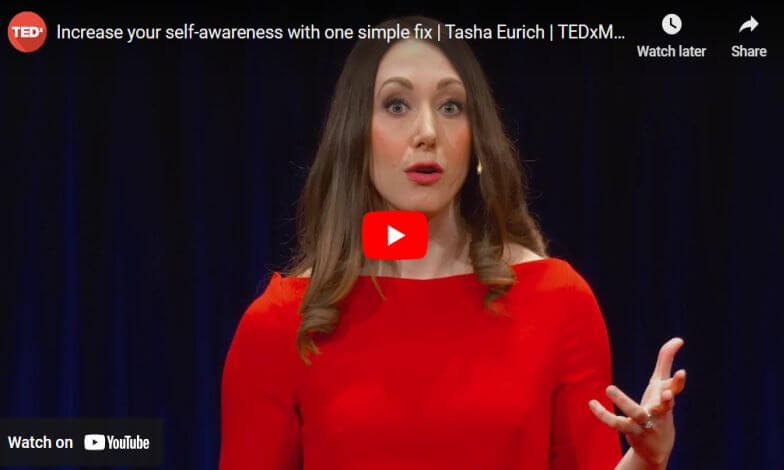
Increase your self-knowledge with one simple fix | Tasha Eurich | TEDxMileHigh
Frequently Asked Questions
What is the meaning of self-awareness?
It is understanding your thoughts, emotions, and behaviors, and recognizing how they impact you and others.
How do you build self-consciousness?
Building self-knowledge involves mindfulness, reflection, seeking feedback, and embracing personal strengths and weaknesses for continuous growth and improvement.
How can I improve my self-awareness?
Practice mindfulness, seek feedback, journal, and engage in introspection to understand your thoughts, emotions, and behaviors better.
Why is self-awareness important?
It enhances emotional intelligence, improves decision-making, promotes better relationships, and promotes personal growth and development.
A Word from The Conducts of Life
Self-awareness is a crucial aspect of personal and professional development.
It involves introspecting to gain knowledge and understanding about yourself, including emotions, thoughts, strengths, and weaknesses.
By recognizing the different types of self-consciousness and understanding its importance, you can promote personal growth, enhance emotional intelligence, and improve communication abilities.
Ultimately, embracing self-understanding leads to a deeper connection with yourself and a more fulfilling life journey.
Pious Clements is the insightful voice behind "The Conducts of Life" blog, where he writes about life ethics, self-development, life mastery, and the dynamics of people and society.
With a profound understanding of human behaviuor and societal dynamics, Pious offers thought-provoking perspectives on ethical living and personal growth.
Through engaging narratives and astute observations, he inspires readers to navigate life's complexities with wisdom and integrity, encouraging a deeper understanding of the human experience and our place within society.

